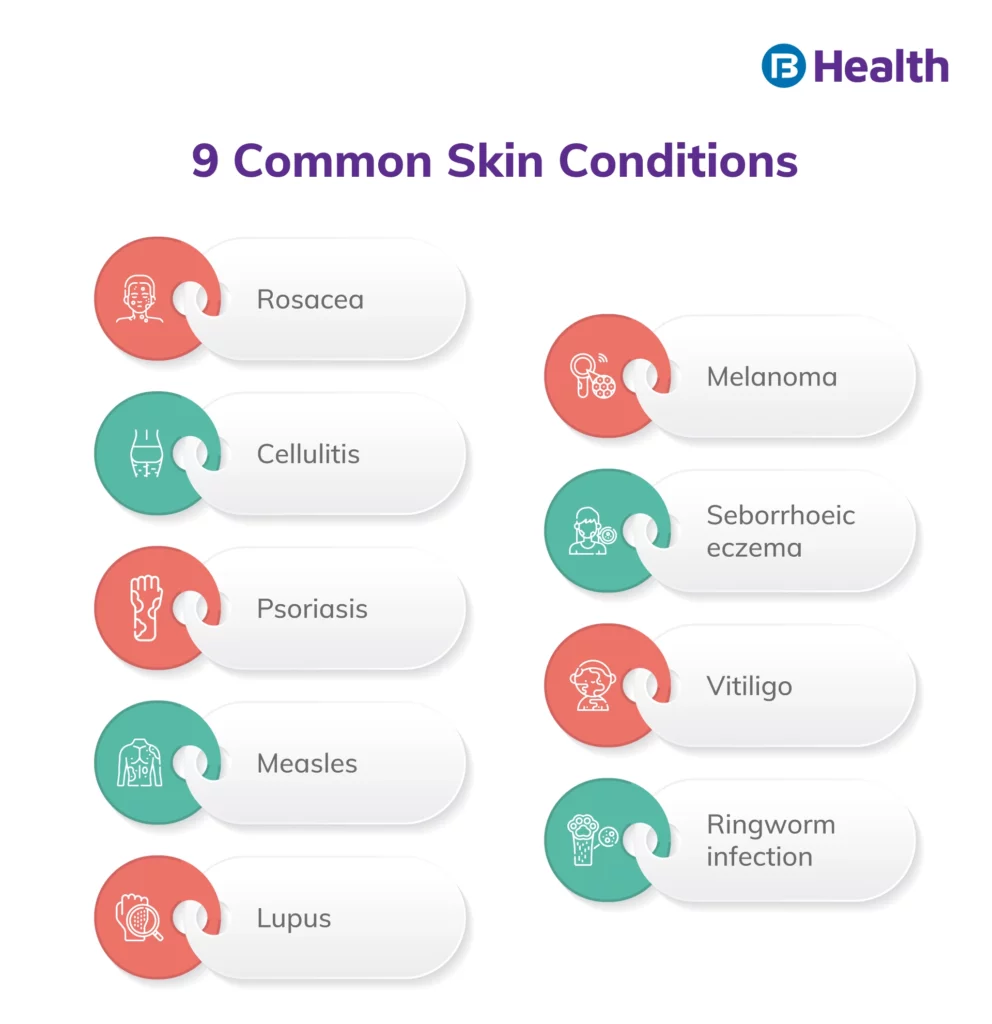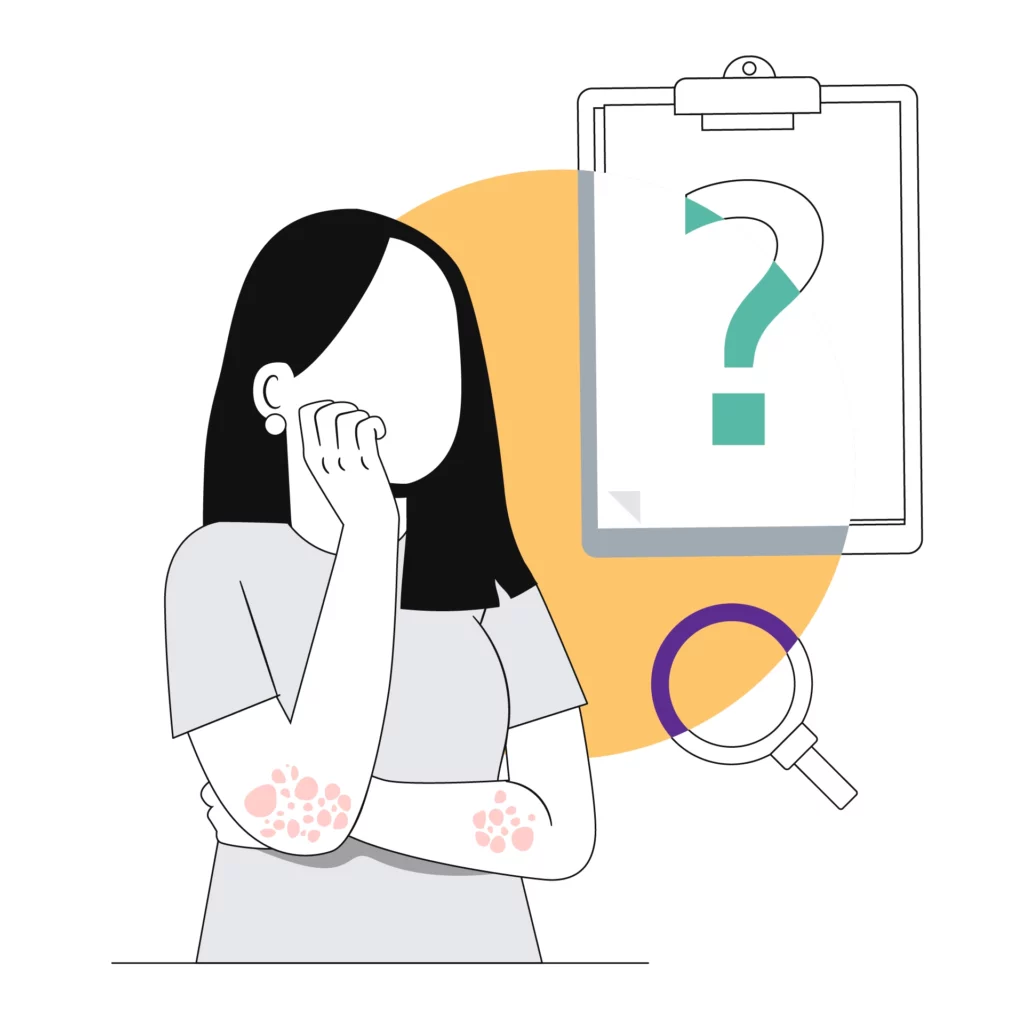Physical Medicine and Rehabilitation | 6 min read
Skin Disease Condition: Causes, Symptoms, and Diagnosis
Medically reviewed by
- Table of Content
Synopsis
There are numerous types of skin diseases, and some of their signs may be common. That’s why it is important to know about each in detail. Find out all you need to know about skin conditions.
Key Takeaways
- Skin disease may cause inflammation, itchiness, rashes or other skin changes
- The common causes of skin disease include genetic and lifestyle factors
- Skin conditions may be treated with medications or lifestyle changes
Skin disease is a condition that causes itchiness, inflammation, rashes, or other skin changes. Skin disease types include hereditary conditions as well as lifestyle-related ailments. Skin disease treatment may include lifestyle changes, ointments, creams, or medications. Read on to learn more about skin disease, including its causes, types, symptoms, and treatment.
What Is Skin Disease?
A skin disease is a type of condition that inflames, irritates, or clogs your skin. It can lead to rashes and other types of skin changes. As a result of skin disease, the following functions of the skin get affected:
- Fluid retention and prevention of dehydration
- Reception of sensations
- Synthesis of vitamin D from sunlight
- Prevention of infections caused by a virus, bacteria, and other microorganisms
- Stabilization of your body temperature

What Are The Usual Skin Disease Causes?
Here are the usual factors that lead to skin disease:
- Bacteria stuck in hair follicles and skin pores
- Hereditary factors
- Exposure to sunlight
- Conditions that impact your kidneys, thyroid or immune system
- Diabetes
- contact with another person’s infected skin or allergens
- Medications for the treatment of conditions such as inflammatory bowel disease
- Viral infections
- Fungus or parasites on your skin
Apart from these, different lifestyle factors can lead to a number of skin conditions. Remember, changes in your skin are not always caused by skin diseases. For example, if a pair of shoes don’t match your feet, you can get a blister by wearing them. However, when you get a skin disease with no apparent cause, it can be associated with an underlying condition.
Skin Disease Symptoms
Skin disease symptoms depend on the type of condition. Here are the usual skin disease symptoms:
- Rough or scaly skin
- Dry skin
- Peeling skin
- Open sores, ulcers, or lesions
- White or red bumps filled with pus
- Discolored skin patches
- Rashes, accompanied by pain and itchiness
How To Diagnose Skin Disease?
Doctors may identify conditions in your skin through visual examination. If that is not sufficient, they may recommend the following tests:
- Culture: Collection of a skin sample to check for viruses, fungi, or bacteria
- Biopsy: Removal of a small piece of skin to examine for cancer
- Tzanck test: Examination of blister fluid to identify herpes zoster or herpes simplex
- Dermo copy: Use of a hand-held device named a dermatoscopy to identify skin conditions
- Skin patch test: Application of small amounts of substances to check whether allergic reactions take place
- Wood light test or black light examination: Use of a UV light in order to get a clear view of your skin’s pigment
- Diascopy: Pressing of a microscopic slide against a skin patch to check if the colour changes
Treatments For Skin Disease
Skin disease treatment doesn’t have any generic approach, as there are numerous types of skin diseases. Based on your conditions, doctors may recommend the following:
- Moisturizers
- Medicated gels, ointments or creams
- Antihistamines
- Antibiotics
- Steroid injections, creams or pills
- Surgery
Doctors may also ask you to make the following lifestyle changes as part of your skin disease treatment:
- Avoid smoking and limit alcohol if you cannot avoid it
- Reduce stress
- Cleanse your skin regularly
- Stay away from foods such as dairy and sugar products if they affect your skin
Type of Skin Diseases
Blister
This skin disease is marked by a number of watery flare-ups on your skin. Blisters may develop anywhere on your body.
Acne
Commonly found in the upper region of your body, breakouts of acne include pimples, whiteheads, blackheads, nodules and cysts [1]. In case you don’t treat the condition, it may leave scars on your skin.
Contact dermatitis
This is an allergen-induced skin disease that may appear within hours to days post-contact. It leads to the formation of a rash at the site of contact. As a result, your skin may become raw, scaly or itchy.
Additional Read: Contact Dermatitis TypesMelasma
This skin disease leads to the formation of dark patches on your face. In some cases, they may also appear on your arms, chest, or neck. This condition is quite common among pregnant people and individuals with high exposure to sunlight.
Hives
Hives are itchy, irritating and tender welts triggered by exposure to allergens. Depending on the colour of your skin, the colour of hives varies.
Latex allergy
This condition can become a medical emergency due to its severe impact. Latex contact can lead to developing red, warm and itchy marks on your skin. Latex particles moving in the air may also trigger allergy symptoms such as sneezing, runny nose, cough, and red eyes and may even cause trouble breathing.
Additional Read: What is Melasma?Cold sore
In this disease, a red, inflamed, irritating blister appears on or around the lips. Other signs that may also accompany cold sores include body aches and low fever.
Eczema
This condition comes with yellow or white scaly patches that gradually come off the skin’s surface. Areas impacted by eczema may appear oily, greasy or itchy. Hair loss in the affected area is another symptom of eczema.
Keratosis pilaris
This skin condition usually appears on the legs and arms but can also develop on your trunk, buttocks and face. It leads to red and bumpy patches of skin. In most cases, the condition fades on its own by the age of 30.
Additional Read: What is Keratosis Pilaris
Carbuncle
If a red, inflamed and irritating lump has developed under your skin, doctors may diagnose it as a carbuncle. This skin disease may have associated symptoms such as fatigue, body aches and fever [2].
Actinic keratosis
If you have actinic keratosis, it will lead to a thick skin patch that will appear like scales or crusts. This skin disease usually develops on parts of the body that are highly exposed to the sun, such as your scalp, face, neck, hands, and arms.
Apart from these skin diseases, which are benign in nature, there are two types of skin cancers - basal cell carcinoma and squamous cell carcinoma.
Basal cell carcinoma
Here scar-like raised, firm and pale lesions develop on the affected area of your skin. Growing blood vessels may be visible inside. It may lead to frequent bleeding or an oozing wound that doesn’t heal.
Squamous cell carcinoma
Squamous cell carcinoma skin cancer is caused by exposure to the UV ray, and affected body parts may include the ears, face, and back of the hands. Like basal cell carcinoma, this skin disease can also lead to frequent bleeding.
Common Skin Disorders In Children
Just like adults, children are often affected by skin diseases. Note that while some skin conditions are common in children and adults, certain skin disorders in children are rare among adults. Here’s a list of all skin disorders children may experience:
- Diaper rash
- Eczema
- Chickenpox
- Seborrhoeic dermatitis
- Wart
- Measles
- Fifth disease
- Acne
- Impetigo
- Ringworm
- Hives
- Rash due to allergic reactions
- Rash due to fungal or bacterial infections
Conclusion
To know more about these skin conditions and understand the treatment approach for each skin disease, you can book a consultation with a dermatologist on Bajaj Finserv health. The doctor will answer all your questions regarding skin disease and recommend suitable tests or medications if they suspect or diagnose any condition. If you are experiencing certain symptoms of skin disease, don’t wait. Get a doctor consultation right away!
- References
- https://www.niams.nih.gov/health-topics/acne
- https://www.ncbi.nlm.nih.gov/books/NBK554459/
- Disclaimer
Please note that this article is solely meant for informational purposes and Bajaj Finserv Health Limited (“BFHL”) does not shoulder any responsibility of the views/advice/information expressed/given by the writer/reviewer/originator. This article should not be considered as a substitute for any medical advice, diagnosis or treatment. Always consult with your trusted physician/qualified healthcare professional to evaluate your medical condition. The above article has been reviewed by a qualified doctor and BFHL is not responsible for any damages for any information or services provided by any third party.




